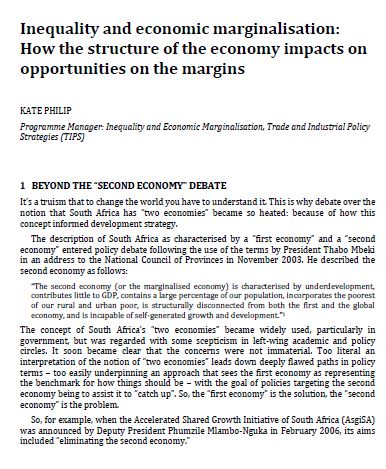Inequality and economic marginalisation
How the structure of the economy impacts on opportunities on the margins

In the face of a long-standing unemployment crisis that increasingly threatens social and economic stability, employment has at last taken centre stage in South African policy, and with this, focus is shifting to the structural constraints on employment creation within the economy. The New Growth Path, approved by Cabinet in November 2010, starts to tackle these issues.
Its emphasis on inclusive growth places issues of distribution more clearly on the agenda than they have been; and the Competition Commission has become poor consumers’ knight in shining armour, tackling collusion and highlighting the negative economic (and employment) consequences of South Africa’s highly centralized core economy.
What does this mean, however, for what used to be called ‘the second economy’?
While much scholarship has focused on critiquing the concept of the second economy – with good reason – the stark inequalities that characterize South African society and its economy mean that policy-making processes still struggle to straddle both ends of the spectrum. What is good for the developed end of the economy can seem to be far removed from concerns in more marginalised contexts.
This article argues that the sharp divides in access and opportunity need to be located within the context of structural inequality. It focuses in particular on how the highly unequal structure of the economy impacts on economic opportunities at the more marginalised end of the economy, and how common sets of processes within a single economy produce and reproduce these outcomes. This locks people into poverty in ways that cannot simply be dismissed as a problem of ‘dependency’ - despite a growing tendency to do so. The article concludes by considering what this analysis means for development strategies targeting the unemployed and those eking out survivalist incomes.


Comments